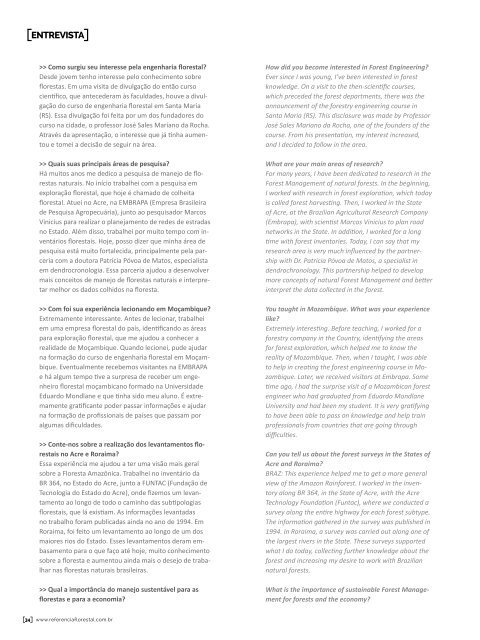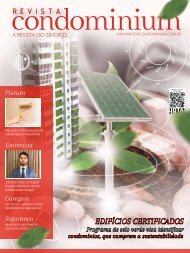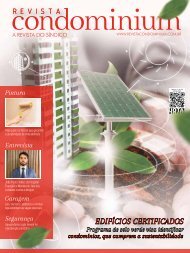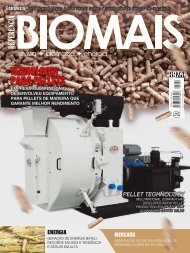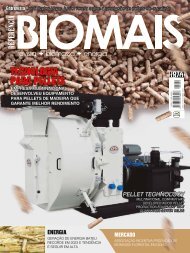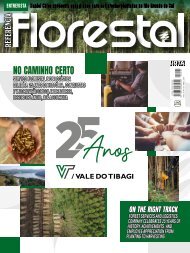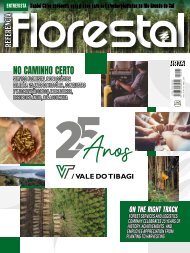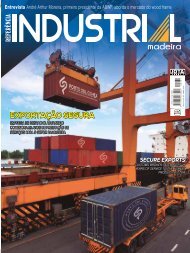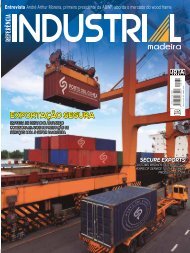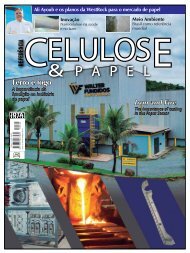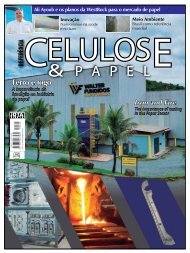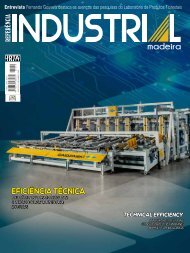You also want an ePaper? Increase the reach of your titles
YUMPU automatically turns print PDFs into web optimized ePapers that Google loves.
ENTREVISTA<br />
>> Como surgiu seu interesse pela engenharia florestal?<br />
Desde jovem tenho interesse pelo conhecimento sobre<br />
florestas. Em uma visita de divulgação do então curso<br />
científico, que antecederam às faculdades, houve a divulgação<br />
do curso de engenharia florestal em Santa Maria<br />
(RS). Essa divulgação foi feita por um dos fundadores do<br />
curso na cidade, o professor José Sales Mariano da Rocha.<br />
Através da apresentação, o interesse que já tinha aumentou<br />
e tomei a decisão de seguir na área.<br />
>> Quais suas principais áreas de pesquisa?<br />
Há muitos anos me dedico a pesquisa de manejo de florestas<br />
naturais. No início trabalhei com a pesquisa em<br />
exploração florestal, que hoje é chamado de colheita<br />
florestal. Atuei no Acre, na EMBRAPA (Empresa Brasileira<br />
de Pesquisa Agropecuária), junto ao pesquisador Marcos<br />
Vinicius para realizar o planejamento de redes de estradas<br />
no Estado. Além disso, trabalhei por muito tempo com inventários<br />
florestais. Hoje, posso dizer que minha área de<br />
pesquisa está muito fortalecida, principalmente pela parceria<br />
com a doutora Patrícia Póvoa de Matos, especialista<br />
em dendrocronologia. Essa parceria ajudou a desenvolver<br />
mais conceitos de manejo de florestas naturais e interpretar<br />
melhor os dados colhidos na floresta.<br />
>> Com foi sua experiência lecionando em Moçambique?<br />
Extremamente interessante. Antes de lecionar, trabalhei<br />
em uma empresa florestal do país, identificando as áreas<br />
para exploração florestal, que me ajudou a conhecer a<br />
realidade de Moçambique. Quando lecionei, pude ajudar<br />
na formação do curso de engenharia florestal em Moçambique.<br />
Eventualmente recebemos visitantes na EMBRAPA<br />
e há algum tempo tive a surpresa de receber um engenheiro<br />
florestal moçambicano formado na Universidade<br />
Eduardo Mondlane e que tinha sido meu aluno. É extremamente<br />
gratificante poder passar informações e ajudar<br />
na formação de profissionais de países que passam por<br />
algumas dificuldades.<br />
>> Conte-nos sobre a realização dos levantamentos florestais<br />
no Acre e Roraima?<br />
Essa experiência me ajudou a ter uma visão mais geral<br />
sobre a Floresta Amazônica. Trabalhei no inventário da<br />
BR 364, no Estado do Acre, junto a FUNTAC (Fundação de<br />
Tecnologia do Estado do Acre), onde fizemos um levantamento<br />
ao longo de todo o caminho das subtipologias<br />
florestais, que lá existiam. As informações levantadas<br />
no trabalho foram publicadas ainda no ano de 1994. Em<br />
Roraima, foi feito um levantamento ao longo de um dos<br />
maiores rios do Estado. Esses levantamentos deram embasamento<br />
para o que faço até hoje, muito conhecimento<br />
sobre a floresta e aumentou ainda mais o desejo de trabalhar<br />
nas florestas naturais brasileiras.<br />
>> Qual a importância do manejo sustentável para as<br />
florestas e para a economia?<br />
How did you become interested in Forest Engineering?<br />
Ever since I was young, I’ve been interested in forest<br />
knowledge. On a visit to the then-scientific courses,<br />
which preceded the forest departments, there was the<br />
announcement of the forestry engineering course in<br />
Santa Maria (RS). This disclosure was made by Professor<br />
José Sales Mariano da Rocha, one of the founders of the<br />
course. From his presentation, my interest increased,<br />
and I decided to follow in the area.<br />
What are your main areas of research?<br />
For many years, I have been dedicated to research in the<br />
Forest Management of natural forests. In the beginning,<br />
I worked with research in forest exploration, which today<br />
is called forest harvesting. Then, I worked in the State<br />
of Acre, at the Brazilian Agricultural Research Company<br />
(Embrapa), with scientist Marcos Vinicius to plan road<br />
networks in the State. In addition, I worked for a long<br />
time with forest inventories. Today, I can say that my<br />
research area is very much influenced by the partnership<br />
with Dr. Patricia Póvoa de Matos, a specialist in<br />
dendrochronology. This partnership helped to develop<br />
more concepts of natural Forest Management and better<br />
interpret the data collected in the forest.<br />
You taught in Mozambique. What was your experience<br />
like?<br />
Extremely interesting. Before teaching, I worked for a<br />
forestry company in the Country, identifying the areas<br />
for forest exploration, which helped me to know the<br />
reality of Mozambique. Then, when I taught, I was able<br />
to help in creating the forest engineering course in Mozambique.<br />
Later, we received visitors at Embrapa. Some<br />
time ago, I had the surprise visit of a Mozambican forest<br />
engineer who had graduated from Eduardo Mondlane<br />
University and had been my student. It is very gratifying<br />
to have been able to pass on knowledge and help train<br />
professionals from countries that are going through<br />
difficulties.<br />
Can you tell us about the forest surveys in the States of<br />
Acre and Roraima?<br />
BRAZ: This experience helped me to get a more general<br />
view of the Amazon Rainforest. I worked in the inventory<br />
along BR 364, in the State of Acre, with the Acre<br />
Technology Foundation (Funtac), where we conducted a<br />
survey along the entire highway for each forest subtype.<br />
The information gathered in the survey was published in<br />
1994. In Roraima, a survey was carried out along one of<br />
the largest rivers in the State. These surveys supported<br />
what I do today, collecting further knowledge about the<br />
forest and increasing my desire to work with Brazilian<br />
natural forests.<br />
What is the importance of sustainable Forest Management<br />
for forests and the economy?<br />
34 www.referenciaflorestal.com.br


